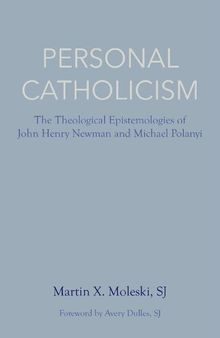 جزییات کتاب
جزییات کتاب
In Personal Catholicism, Father Martin Moleski argues that Catholic doctrine rests on the foundation of personal knowledge. The first part of the book maintains that there is a very striking similarity in the epistemologies of John Henry Newman, a convert to Catholicism from the nineteenth century, and Michael Polanyi, a scientist-turned-philosopher from the twentieth. By mapping each man's work in turn, the author shows that both men recognized the same key features of the life of the mind, although they used different terminology to develop similar insights. Newman spoke of the illative sense, by which the mind guides itself in all concrete reasoning, while Polanyi focused on the tacit dimension of personal knowledge. The second part of the book explores some of the theological implications of the epistemology of personal knowledge. Because "all knowledge is tacit or rooted in tacit knowledge" (Polanyi), all of Catholicism, to the extent that it may be construed as a body of knowledge, is "tacit or rooted in tacit knowledge." The book is intended to serve as a foundation for post-critical theology. Newman and Polanyi provide an antidote to the skepticism generated by empiricism, positivism, objectivism, and rationalism. The post-critical view offers relief from closed systems inspired by the Cartesian model of clear and distinct ideas, formal operations, propositional rigidity, and chains of argument. The ground which Newman and Polanyi have in common should prove a fruitful resource for doing systematic theology less systematically and for defending dogma non-dogmatically. This book takes up issues relevant to epistemology, philosophy of science, natural theology, apologetics, and systematic theology.



 دانلود کتاب
دانلود کتاب

 جزییات کتاب
جزییات کتاب

 این کتاب رو مطالعه کردید؟ نظر شما چیست؟
این کتاب رو مطالعه کردید؟ نظر شما چیست؟
